

Comment accompagner la transformation digitale d'un groupe ? - Matthias Moreau. Six quotes explain why WhatsApp’s CEO is now a billionaire and you’re not. WhatsApp co-founder Jan Koum has made some notable public pronouncements in recent years as mobile message app raked in users.
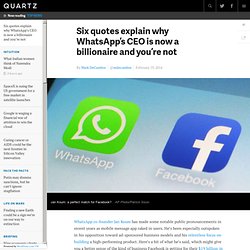
He’s been especially outspoken in his opposition toward ad-sponsored business models and his relentless focus on building a high-performing product. Here’s a bit of what he’s said, which might give you a better sense of the kind of business Facebook is getting for their $19 billion in cash and stock. “We focus a lot on the quality of experience, speed, reliability. It’s not sexy from a lot of people’s perspective, it’s not glitzy in the feature set, but it’s what people come to rely on,” Koum told the Financial Times in an interview (paywall) back in November. “We view monetization as five, 10 years down the road. Harvard-Backed Experfy Wants To Create A McKinsey In The Cloud For Big Data Talent. There is a scramble to find the right big data talent, especially for short-term data projects currently being outsourced to big consulting companies such as Accenture, Deloitte apart from several niche suppliers.
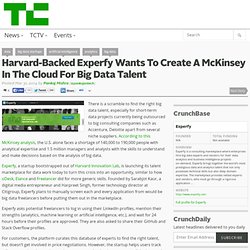
According to this McKinsey analysis, the U.S. alone faces a shortage of 140,000 to 190,000 people with analytical expertise and 1.5 million managers and analysts with the skills to understand and make decisions based on the analysis of big data. Experfy, a startup bootstrapped out of Harvard Innovation Lab, is launching its talent marketplace for data work today to turn this crisis into an opportunity, similar to how oDesk, Elance and Freelancer did for more generic skills. Founded by Sarabjot Kaur, a digital media entrepreneur and Harpreet Singh, former technology director at Citigroup, Experfy plans to manually screen each and every application from would be big data freelancers before putting them out in the marketplace. Welcome To The French Tech Ecosystem.
This is the story of a city that keeps reinventing itself.

Over the past three weeks, I’ve been walking around Paris to meet with the brightest minds of a tech ecosystem in the making. My experience is as personal as it is relevant about what makes a startup ecosystem work, and why Europe is the next frontier. When I first decided that I wanted to move to Paris, I was anxious and excited at the same time. I used to write for TechCrunch in New York, in a perpetually effervescent ecosystem. But I wanted to try something new. I didn’t get it. I recently talked with a VC-turned-entrepreneur about the seismic changes in the tech scene. You can receive up to 70 percent of your salary for up to two years when you create a company.
As a business angel, when you invest in a startup, you will pay less tax. Building An Ecosystem An ecosystem is a four-sided network — you need entrepreneurs, VC firms, schools, and journalists. What about entrepreneurs? But I think one thing is still missing. 10 métiers qui risquent de disparaître. Dans une étude intitulée « Le futur de l’emploi », Carl Benedikt Frey et Michael A.

Osborne, deux chercheurs de l’Université d’Oxford, ont examiné plus de 700 métiers pour savoir lesquels avaient le plus de chances d’être remplacés par des machines dans un futur proche. En se basant sur un algorithme complexe et les prédictions de Keynes sur le développement du « chômage technologique », les deux chercheurs ont établi un classement des métiers en fonction de leur probable « computerisation » (le remplacement de certaines tâches répétitives par des machines ou des ordinateurs). Aucun risque pour les métiers de la santé En tête de liste on retrouve les emplois pour lesquels la probabilité de remplacement par des machines est très faible. En queue de peloton, avec un taux de probable computerisation proche de 1, de nombreux métiers d’aujourd’hui sont sans doute voués à disparaître. 1.
Accenture identifie 6 marchés en voie de disruption digitale. What’s the 'next big thing' for business? Have your say at #CEOSurvey - CEO insights. Author: Suzanne Snowden, Global Thought Leadership Business leaders and consumers alike have come through the hardest and longest recession since the last world war.
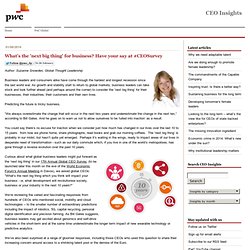
As growth and stability start to return to global markets, business leaders can take stock and look further ahead (and perhaps around the corner) to consider the ‘next big thing’ for their businesses, their industries, their customers and their own lives. Predicting the future is tricky business. “We always overestimate the change that will occur in the next two years and underestimate the change in the next ten,” according to Bill Gates. And he goes on to warn us not to allow ourselves to be ‘lulled into inaction’ as a result. You could say there’s no excuse for inaction when we consider just how much has changed in our lives over the last 10 to 15 years: from how we phone home, share photographs, read books and grab our morning coffees. À quoi ressemblera votre quotidien au travail en 2053 ? Comment s'organisera une journée de travail en 2053?

Plusieurs experts se sont posé la question, et expliquent notamment que la retraite aura potentiellement disparu, ainsi que la hiérarchie dans les entreprises, tandis que l'alternance des métiers sera devenue la norme. Imaginez: nous sommes en 2053. La notion de «bureau» a quasiment disparu, les usines ne sont peuplées que de robots, qui ont fait disparaître la notion de pénibilité au travail, les métiers manuels sont devenus minoritaires...
À l'occasion du 40e anniversaire de l'Agence nationale pour l'amélioration des conditions de travail (Anact), célébré mardi, des experts, des syndicalistes ou des représentants du patronat se sont prêtés au jeu de se projeter 4quarante ans en avant, et d'essayer d'imaginer, ce qui va potentiellement changer dans notre quotidien au travail. Pour Jacques Froissant, fondateur du cabinet de recrutement Altaïde, les prévisions observées sont plutôt réalistes. Dix tendances à suivre - Dossiers. 30/10/2013 - Soumises aux diktats de l'innovation, les entreprises s'abreuvent des recueils de tendances.
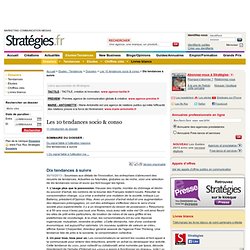
Actuelles ou futuristes, globales ou de niche, voici une sélection de dix tendances conso et socio qui font bouger les lignes. 1. L'usage plus que la possession. Hausse des impôts, montée du chômage et déclin du pouvoir d'achat, les cordons de la bourse des Français restent noués. Résultat: la consommation change. 2. 3. 4. 5. 6. 7. 8. 9. 10. CEOs Should Get Out of the Saddle Before They’re Pushed Out - Michael Jarrett. By Michael Jarrett | 10:00 AM November 27, 2013 When is the best time for a CEO to leave the top spot?
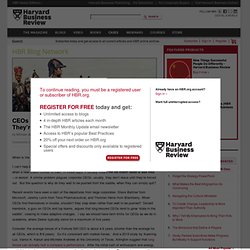
I can’t help but think of the Mel Brooks film Blazing Saddles — a satirical comedy of what happens when a new sheriff comes to town. In those days, it usually meant the old sheriff failed or was fired – or worse! A similar problem plagues corporate CEOs: usually, they don’t leave until they’re forced out. But the question is why do they wait to be pushed from the saddle, when they can simply quit? Recent events have seen a rash of the departures from large corporates: Steve Ballmer from Microsoft, Jeremy Levin from Teva Pharmaceutical, and Thorsten Heins from Blackberry. Consider: the average tenure of a Fortune 500 CEO is about 4.6 years (shorter than the average for all CEOs, which is 8.6 years).
Those who overstay their welcome may do so for any number of reasons. A look at the more successful CEOs shows that they do quit while they’re ahead. James McNerney, Jr is another example. Philip Evans: How data will transform business.